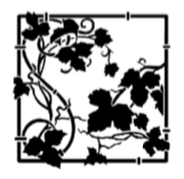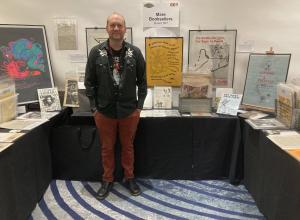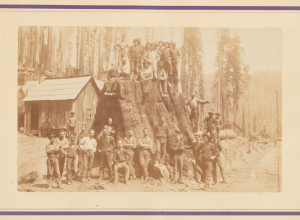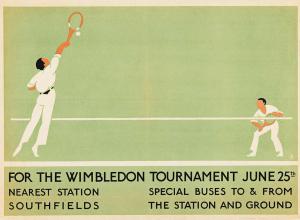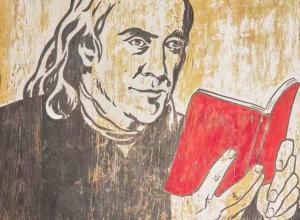Charles Darwin's Unsolicited Das Kapital from Karl Marx Goes on Display
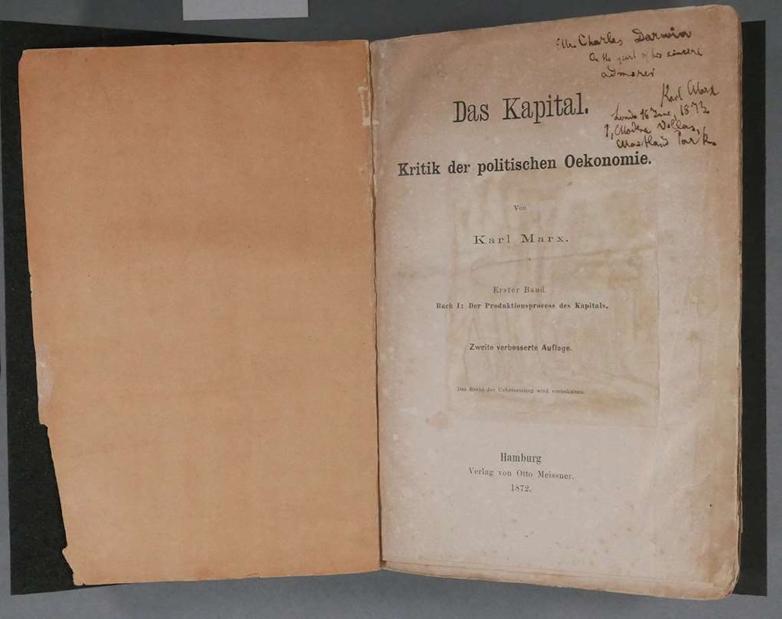
The copy of Das Kapital before conservation work
An intriguing copy of Karl Marx's work Das Kapital is returning to Down House in Kent, home of Charles Darwin, following specialist conservation work by Cambridge University Library.
As the charity that cares for Down House, English Heritage is putting the book on public display for the first time in more than five years.
The book, which was personally inscribed and sent to Darwin as a gift in June 1873 "on the part of his sincere admirer, Karl Marx" appears not to have been very well received. With most of its pages remaining uncut, it seems Darwin gave up any attempt to read it. It took the scientist almost three months to compose a reply to Marx; finally writing a note of thanks, albeit with none of his usual color and warmth, in October 1873:
Dear Sir:
I thank you for the honour which you have done me by sending me your great work on Capital; & I heartily wish that I was more worthy to receive it, by understanding more of the deep and important subject of political Economy. Though our studies have been so different, I believe that we both earnestly desire the extension of Knowledge, & that this is in the long run sure to add to the happiness of Mankind.
I remain, Dear SirYours faithfully,
Charles Darwin
The special copy of Das Kapital was in need of conservation, after the book's spine had become increasingly delicate.
Cambridge University Library, which owns the book and loans it to English Heritage, undertook a series of specialist works to prevent further deterioration of the book's structure. This included the conservator adhering the flaking areas of the spine and applying a thin layer of tissue to it, acting as a barrier and preventing any further loss. Small tears on the cover were also repaired and the entire surface has been painstakingly cleaned.
Dr Tessa Kilgarriff, Curator of Collections and Interiors at English Heritage, said: "It is evident from his personal gift and subsequent work that Marx was a follower of Darwin's theories. However, the uncut pages and lack of customary pencil marks suggest Darwin was less enamoured with Marx's writing, or quite possibly that his German simply wasn't up to scratch!
"As well as giving us an amusing insight into the dynamics between these two prominent intellectuals, Down House's copy of Das Kapital is a fantastic piece of social history, highlighting how Charles Darwin's theories filtered through Victorian society and transformed popular ideas of biology and nature. Now more than 150 years old, this fragile volume has been preserved and many more people will have the chance to enjoy it for years to come.'
While much of Darwin's scientific reading was in German, an account by his son Francis Darwin suggests that he struggled with the language: "In reading a book after him, I was often struck at seeing, from the pencil-marks made each day where he left off, how little he could read at a time. He used to call German the 'Verdammte', pronounced as if in English. He was especially indignant with Germans, because he was convinced that they could write simply if they chose, and often praised D.F Hildebrand for writing German which was as clear as French… He himself learnt German simply by hammering away with a dictionary; he would say that his only way was to read a sentence a great many times over, and at last the meaning occurred to him."






